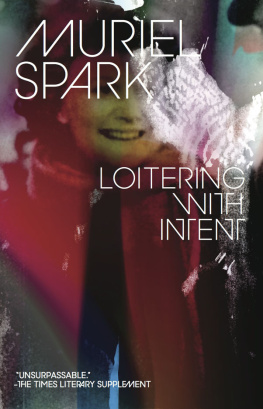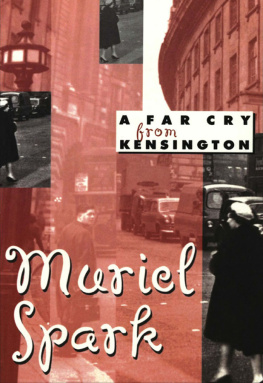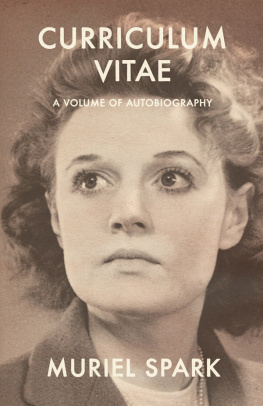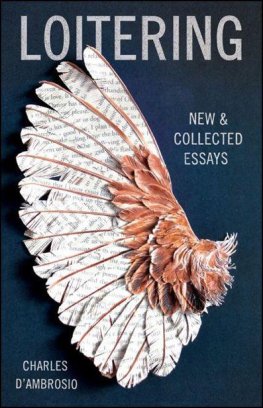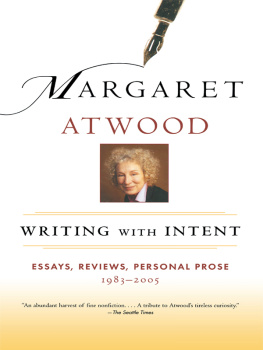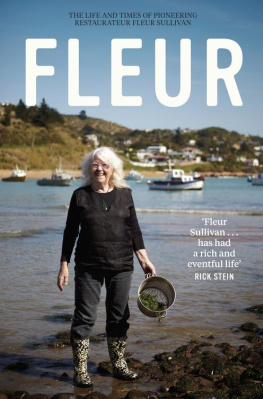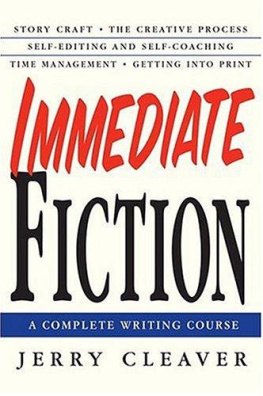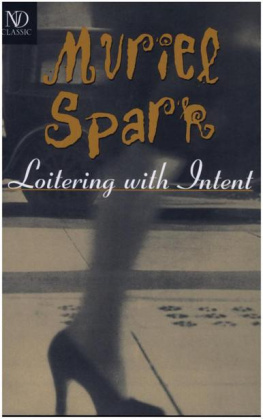LOITERING
WITH INTENT
Muriel Spark
A NEW DIRECTIONS BOOK
Copyright 1981 by Copyright Administration, Ltd.
All rights reserved. Except for a brief passage quoted in a newspaper, magazine, radio, television, or website review, no part of this book may be reproduced in any form or by any means, electronic or mechanical, including photocopying and recording, or by any information storage or retrieval system, without permission in writing from the Publisher.
Published by arrangement with Dame Muriel Spark and her agent
Georges Borchardt, Inc., New York.
Originally published in 1981 by Coward, McCann & Geoghegan, New York
First published as a New Directions Classic in 2001. Republished as
New Directions Paperbook 1286 in 2014
ISBN 978-0-8112-2303-4
Design by Erik Rieselbach
The Library of Congress has cataloged the printed edition as follows:
Loitering with intent / Muriel Spark.
p. cm.
ISBN 978-0-8112-1975-4 (e-book)
1. AutobiographySocieties, etc.Fiction. 2. FictionAuthorship
Fiction. 3. Women novelistsFiction. 4. Young womenFiction.
5. ExtortionFiction.
I. Title. II. Series.
PR6037.P29 L6 2001
823'.914--dc21 2001030129
New Directions books are published for James Laughlin
by New Directions Publishing Corporation
80 Eighth Avenue, New York 10011
BY MURIEL SPARK
AVAILABLE FROM NEW DIRECTIONS
The Abbess of Crewe
All the Poems of Muriel Spark
All the Stories of Muriel Spark
The Bachelors
The Ballad of Peckham Rye
The Comforters
Curriculum Vitae
The Drivers Seat
A Far Cry From Kensington
The Ghost Stories of Muriel Spark
The Girls of Slender Means
The Informed Air: Essays
Loitering with Intent
Memento Mori
Not to Disturb
Open to the Public
The Public Image
Robinson
Symposium
Territorial Rights
Chapter One
One day in the middle of the twentieth century I sat in an old graveyard which had not yet been demolished, in the Kensington area of London, when a young policeman stepped off the path and came over to me. He was shy and smiling, he might have been coming over the grass to ask me for a game of tennis. He only wanted to know what I was doing but plainly he didnt like to ask. I told him I was writing a poem, and offered him a sandwich which he refused as he had just had his dinner, himself. He stopped to talk awhile, then he said good-bye, the graves must be very old, and that he wished me good luck and that it was nice to speak to somebody.
This was the last day of a whole chunk of my life but I didnt know that at the time. I sat on the stone slab of some Victorian grave writing my poem as long as the sun lasted. I lived nearby in a bed-sitting-room with a gas fire and a gas ring operated by pre-decimal pennies and shillings in the slot, whichever you preferred or had. My morale was high. I needed a job, but that, which should have been a depressing factor when viewed in cold blood, in fact simply was not. Neither was the swinishness of my landlord, a Mr. Alexander, short of stature. I was reluctant to go home lest he should waylay me. I owed him no rent but he kept insisting that I should take a larger and more expensive room in his house, seeing that I had overcrowded the small single room with my books, my papers, my boxes and bags, my food-stores and the evidence of constant visitors who stayed to tea or came late.
So far I had stood up to the landlords claim that I was virtually living a double-room life for single-room pay. At the same time I was fascinated by his swinishness. Tall Mrs. Alexander always kept in the background so far as the renting of rooms was concerned, determined not to be confused with a landlady. Her hair was always glossy black, new from the hairdresser, her nails polished red. She stepped in and out of the house with a polite nod like another, but more superior, tenant. I fairly drank her in with my mind while smiling politely back. I had nothing whatsoever against these Alexanders except in the matter of their wanting me to take on a higher-priced room. If he had thrown me out I would still have had nothing much against them, I would mainly have been fascinated. In a sense I felt that the swine Alexander was quite excellent as such, surpassingly hand-picked. And although I wanted to avoid him on my return to my lodging I knew very well I had something to gain from a confrontation, should it happen. In fact, I was aware of a daemon inside me that rejoiced in seeing people as they were, and not only that, but more than ever as they were, and more, and more.
At that time I had a number of marvellous friends, full of good and evil. I was close on penniless but my spirits were all the more high because I had recently escaped from the Autobiographical Association (non-profit-making) where I was thought rather mad, if not evil. I will tell you about the Autobiographical Association.
Ten months before the day when I sat writing my poem on the worn-out graves of the dead in Kensington and had a conversation with the shy policeman, Dear Fleur, came the letter.
Dear Fleur. Fleur was the name hazardously bestowed at birth, as always in these cases before they know what you are going to turn out like. Not that I looked too bad, it was only that Fleur wasnt the right name, and yet it was mine as are the names of those melancholy Joys, those timid Victors, the inglorious Glorias and materialistic Angelas one is bound to meet in the course of a long life of change and infiltration; and I once met a Lancelot who, I assure you, had nothing to do with chivalry.
However all that may be, Dear Fleur, went the letter. I think Ive found a job for you!... The letter went on, very boring. It was a well-wishing friend and I have forgotten what she looked like. Why did I keep these letters? Why? They are all neatly bundled up in thin folders, tied with pink tape, 1949, 1950, 1951 and on and on. I was trained to be a secretary; maybe I felt that letters ought to be filed, and Im sure I thought they would be interesting one day. In fact, they arent very interesting in themselves. For example about this time, just before the turn of the half-century, a bookshop wrote to ask for their money or they would take further steps. I owed money to bookshops in those days; some were more lenient than others. I remember at the time thinking the letter about the further steps quite funny and worth keeping. Perhaps I wrote and told them that I was quite terrified of their steps approaching further, nearer, nearer; perhaps I didnt actually write this but only considered doing so. Apparently I paid them in the end for the final receipt is there, 5.8.9.1 always desired books; nearly all of my bills were for books. I possessed one very rare book which I traded for part of my bill with another bookshop, for I wasnt a bibliophile of any kind; rare books didnt interest me for their rarity, but for their content. I borrowed frequently from the public library, but often I would go into a bookshop and in my longing to possess, let us say, the Collected Poems of Arthur Hugh Clough and a new Collected Chaucer, I would get into conversation with the bookseller and run up a bill.
Dear Fleur, I think Ive found a job for you!
I wrote off to the address in Northumberland setting forth my merits as a secretary. Within a week I got on a bus to go and be interviewed by my new employer at the Berkeley Hotel. It was six in the evening. I had allowed for the rush hour and arrived early. He was earlier still, and when I went to the desk to ask for him he rose from a nearby chair and came over to me.

